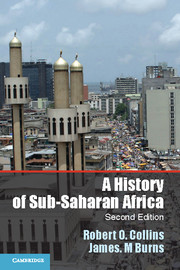Book contents
- Frontmatter
- Dedication
- Contents
- Acknowledgments
- Introduction
- Part I Foundations
- Part II Africa in World History
- Part III Imperial Africa
- 17 Upsetting the equilibrium
- 18 The European conquest of Africa
- 19 Southern Africa, 1486–1910
- 20 European colonial rule in Africa
- 21 The colonial legacy
- Part IV Independent Africa
- Index
- References
17 - Upsetting the equilibrium
Published online by Cambridge University Press: 05 June 2014
- Frontmatter
- Dedication
- Contents
- Acknowledgments
- Introduction
- Part I Foundations
- Part II Africa in World History
- Part III Imperial Africa
- 17 Upsetting the equilibrium
- 18 The European conquest of Africa
- 19 Southern Africa, 1486–1910
- 20 European colonial rule in Africa
- 21 The colonial legacy
- Part IV Independent Africa
- Index
- References
Summary
In 1787, a party of settlers disembarked from a British ship moored at the mouth of the Sherbro River in West Africa. Many of the new arrivals were freed slaves from England and its North American colonies, some of whom had found themselves destitute on the streets of London. Their passage had been paid by a group of affluent British abolitionists, who symbolically called their new settlement Freetown. These idealistic humanitarians envisaged that this new colony would become a model for the regeneration of freed African slaves by a combination of Protestant Christianity and European capitalism that would then spread their civilizing mission throughout the continent. Although many African settlers died from disease and violent confrontations with the indigenous Temne peoples, the Freetown colony eventually flourished to become a safe haven for tens for thousands of freed slaves, an important West African base for the Royal Navy of the antislave trade patrol, and a hub of commercial activity. The descendants of the original colonists developed their own distinctive culture, which was thoroughly Western in outlook, and the subsequent diaspora of this Krio population, as they called themselves, proved instrumental in disseminating Christianity and commerce throughout West Africa.
At the time when Freetown was founded, before it became the colony of Sierra Leone, no one perceived that this philanthropic enterprise was a harbinger of the changing relationship between Africa and Europe. During the first four hundred years of their contact with sub-Saharan Africa, Europeans were confined to a handful of scattered trading stations along the coast. There was a vigorous trade in gold and slaves, profitable to Europeans and Africans alike, but African rulers and merchants were determined to prevent any Europeans from venturing beyond their coastal enclaves for trade or exploration. Moreover, European traders had little incentive to seek out the interior regions when the Africans themselves could supply slaves and other commodities for the European sea merchants. On the West African coast strong kingdoms – Asante, Dahomey, and the Niger delta states – controlled the passage to the interior. On the East African coast, the independent Swahili city-states – Mombasa, Malindi, and Kilwa – blocked the way to the interior despite the theoretical suzerainty of Portugal. Among the Europeans, only two groups – the Dutch on the Cape Colony frontier and the Portuguese in the Zambezi River valley – made successful, although sporadic, efforts to venture into the interior.
- Type
- Chapter
- Information
- A History of Sub-Saharan Africa , pp. 249 - 262Publisher: Cambridge University PressPrint publication year: 2013



